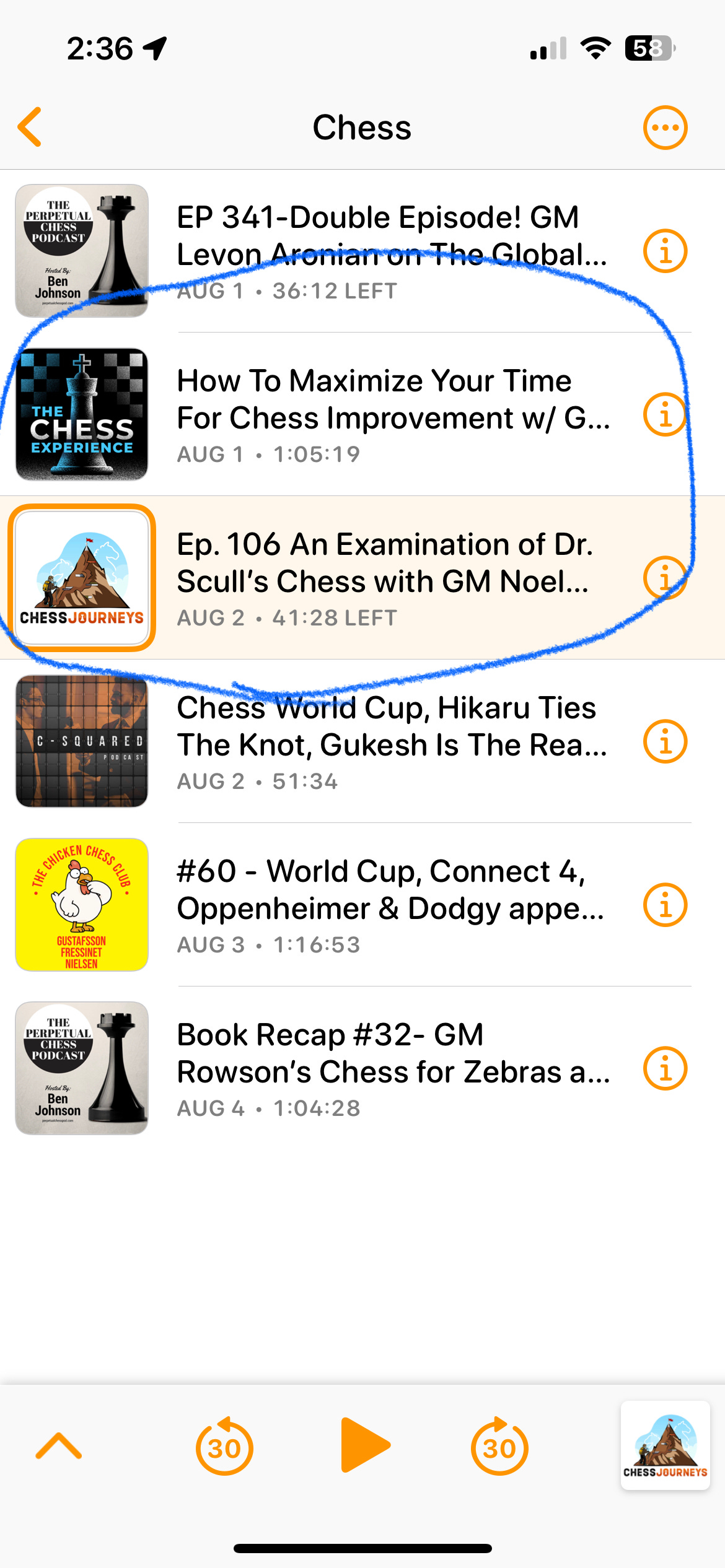Taking improvement advice from GM Noel Studer on chess podcasts
A double-whammy chess improvement advice-a-thon and some notes I wrote down
Somehow this week we #chesspunks podcast-listening adult improvers got not one, but TWO podcast episodes with GM Noel Studer in the span of two days:
In The Chess Experience, Daniel interviewed Noel mostly about questions of study habits and how to get the most out of your time practically. In Chess Journeys, Kevin and Noel had a discussion about his real-life tournament games, and the issues Kevin’s been facing (including lack of confidence, plummeting rating, studying too many things at once).
I thought it would be interesting to list some takeaways (though it’s obvious you should just listen to these for yourself regardless, because Noel is an excellent interviewee).
It is better to form a consistent study habit by studying a sustainable amount over a long period of time, rather than studying too much in huge bursts multiple weeks apart.
It’s better to start small (perhaps you dedicate 30 minutes a day), than to start with a massive training routine (e.g. 4 hours a day) that is likely to produce fatigue.
Distinguish between Chess training and Chess enjoyment. One thing Noel pointed out is that many adult players who want to improve do not realize this difference. This is similar advice we’ve heard before: To train you need to engage in active learning. You need to do the thinking and come up with the moves. Watching chess on Twitch or YouTube just isn’t the same as doing the work yourself. Those are more like chess enjoyment activities. I quibble a bit when he says that game collections are not really useful for chess training, but maybe he has a specific type of activity in mind when he says that.
It’s absolutely 100% OK to engage in as much Chess enjoyment as you want. Noel’s main concern is that you have realistic expectations. If you do chess enjoyment stuff a lot and train very little, do not expect to improve a lot.
The One Third Rule: Studer recommends spending a third of your time on games and analysis, studying and practicing tactics, and then anything else.
When working on that last third of the One Third Rule plan, whatever you pick, focus just on that thing and don’t add other things. Dedicate that to endgame, middlegame, opening, sacrifices book, whatever, but stick to it until you decide it’s time to change your focus.
One trick about this last third is that it stops you from studying openings too much. Since you only have so much time to dedicate to the “extras”, you will train yourself to use that time for openings sparingly, especially since opening study tends to not be the best use of time for improvement anyway and there are more pressing concerns.
One last thing about the One Third Rule. When you have a dedicated study plan, exciting new chess products will not distract you from your training. You will no longer be led astray by new opening books and courses promising quick fixes and fantastic game results — you’ll begin to think soberly and take your time before deciding whether or not to add this to your future training material.
Tactics decide games. This was an amazing part of the Chess Journeys episode. Noel pointed out that simple tactics decided Kevin’s games against or in his favor; and Kevin, for his part, recognized that he was misdiagnosing his problems.
Practice tactics frequently. A lot of Kevin’s losses coincided with a diminished tactics study routine. While he was studying things which were probably a lot more interesting and a lot less mundane, this clearly had a negative effect on his play. This also coincided with an increased blitz habit. I don’t think those two things have a causative relationship, but it does show that tactics practice cannot always be replaced with blitz.
Masters also fall into rating-obsessed habits (such as calculating hypothetical gains or hypothetical scores and performance rating to get to some goal)— it turns out they are human too.
When studying openings: Study the things that come up, rather than trying to build your repertoire all at once. If you lose a game or see something new, that’s the time to take a note and study this when your schedule can fit it in. You cannot win the opening theory rat race because eventually all you would be studying is openings, and your brain won’t have room for anything else. So take it easy on the openings. Keep it simple, and sustainable.
Chess improvement looks a lot like improvement in anything else that requires skill and expertise, but we don’t automatically apply those things analogously.
A lot of chess improvement is both mundane and obvious. Studer cites the Pareto Principle: Roughly 80% of consequences flow from 20% of causes. That 20% (tactics, games and analysis) is where most of your progress as a player will come from. So be relatively sparing with the other inputs.
If any of this sounds interesting to you, why haven’t you started listening to these podcast episodes? And if you want to learn more about Noel or about how to improve at chess, you should also check out his blog. I don’t get any kickback from this, I’m just a fan. You can sign up for a free e-book (it’s pretty good), or sign up to get his newsletter where he puts out articles on chess improvement for free on a weekly basis, or, or sign up for his chess improvement course.
Thoughts? Comments? Leave them below!



Funny..just listened to the two episodes today. Both very enjoyable and refreshing with his ideas. Made some notes but not as in depth as yours so thanks. I really think that his input can help me further focus in on the areas I need to, take his 1/3 principle to action and hopefully see some gains over the next few months.